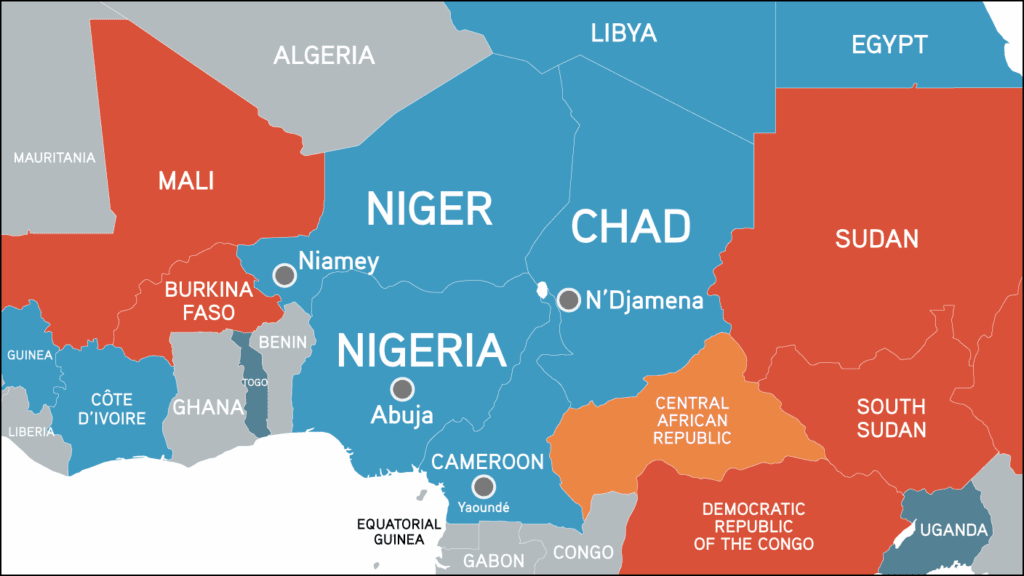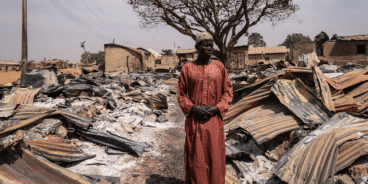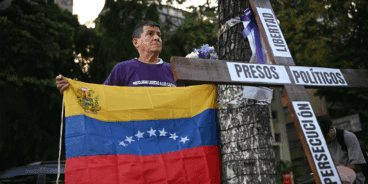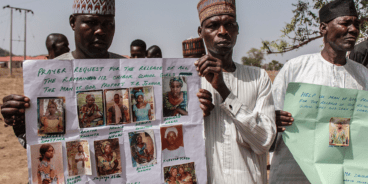Lake Chad Basin (Boko Haram)

The extremist Islamist group Boko Haram poses an ongoing threat to populations in Nigeria, Cameroon, Chad and Niger, where it continues to commit sporadic attacks and mass atrocity crimes.
BACKGROUND:
Despite more than a year of joint military operations against Boko Haram, attacks by the group against civilians continue in Nigeria, Cameroon, Chad and Niger. More than 17,000 people have been killed since Boko Haram launched its armed offensive in 2009.
According to OCHA, over 2.7 million people are currently displaced in Nigeria, Cameroon, Chad and Niger due to Boko Haram activity. Most areas previously affected by violence remain unsafe for the return of refugees and IDPs. An estimated 8.3 million people are in need of food assistance in Nigeria’s Adamawa, Borno and Yobe states, where Boko Haram has been most active.
Boko Haram continues to target women and girls for kidnapping and has used some previously-kidnapped girls to perpetrate suicide bombings. According to the UN Children’s Fund (UNICEF), as of December 2015 more than 1 million children in Nigeria, Cameroon, Chad and Niger are unable to attend school because of Boko Haram attacks on infrastructure and personnel.
A joint military campaign against Boko Haram was initiated in early 2015 by a coalition of troops from Nigeria, Cameroon, Chad and Niger. Despite the offensive, cross-border raids increased, with the Diffa region of Niger alone experiencing more than 70 attacks during 2015, while more than 30 attacks have been carried out in Cameroon since the start of 2016. Attacks also continue in Chad where the government has declared a state of emergency in the Lake Chad region.
On 24 December Nigeria’s President, Muhammadu Buhari, said that Nigeria had “technically won the war” against Boko Haram, whom he said were no longer capable of conducting “conventional attacks” against security forces or major population centers. Despite this claim, on 30 January Boko Haram attacked Dalori village and nearby refugee camps in northeast Nigeria, killing more than 90 people, including children, some of whom were reportedly burned alive. Suicide bombings were also carried out on 9 February at the Dikwa IDP camp in Borno state, killing at least 60 people.
Nigerian security forces have previously failed to provide sufficient protection from Boko Haram and there have been extensive reports of soldiers deserting during attacks. The military has also been accused of committing human rights abuses against civilians, including arbitrary arrests and extrajudicial killings of suspected Boko Haram members.
Nigerian security forces have also been accused of grave abuses while clashing with members of the Islamic Movement of Nigeria (IMN), a Shia group, in Kaduna state. According to Human Rights Watch, at least 300 members of the IMN were killed by security forces between 12 and 14 December, many of them buried in mass graves. The governor of Kaduna state announced the establishment of a Judicial Commission of Inquiry on 17 December. In January the IMN claimed that more than 700 members still remained missing following the December clashes.
Inter-communal violence also continues in Nigeria. According to Benue state officials, hundreds of people were reportedly killed during week-long clashes between Fulani herdsmen and local farmers before violence was halted by security forces on 27 February. President Buhari ordered an investigation. Inter-communal clashes in Nigeria’s “middle belt” region are a recurring phenomenon rooted in longstanding grievances over access to land and other resources.
ANALYSIS:
Although Boko Haram’s insurgency started in Nigeria, during 2015 cross-border attacks became increasingly common, transforming the group into a regional security threat. Despite Boko Haram being significantly weakened by joint military operations, it continues to target civilians in Nigeria, Cameroon, Chad and Niger. While offensives during early 2015 drove Boko Haram out of many previously occupied territories, the group has continued hit-and-run attacks and suicide bombings, killing civilians and destroying villages, demonstrating the its resilience and enduring threat.
Displacement and insecurity have increased unemployment and poverty within Nigeria, Africa’s largest economy. Destroyed civilian infrastructure across the northeast and the threat of continued Boko Haram attacks makes the return of displaced populations dangerous and severely limits humanitarian access.
The deadly military crackdown on the IMN and alleged human rights abuses by Nigeria’s security forces demonstrate the need for security sector reform. Such abuses risk triggering a backlash from the affected communities if not addressed urgently and impartially by judicial organs.
Recurring inter-communal clashes in central Nigeria demonstrate the ongoing need for the government to address the root causes of conflict in the country.
The governments of Nigeria, Cameroon, Chad and Niger are struggling to uphold their Responsibility to Protect and need ongoing support from the international community.
INTERNATIONAL RESPONSE:
Despite the escalating crisis, during Nigeria’s 2014-2015 term as an elected member of the UNSC, the Council only issued three Presidential Statements on efforts to combat Boko Haram. In a 2 February 2016 Press Statement, the UNSC condemned the attack on Dalori village.
In January 2015 the AU Peace and Security Council (AUPSC) authorized deployment of the Multinational Joint Task Force (MNJTF), comprised of troops from Benin, Cameroon, Chad, Niger and Nigeria. The mandate of the force includes “the protection of civilians under immediate threat” of attack from Boko Haram. In January 2016 the AUPSC renewed the MNJTF mandate for 12 months. International actors supporting the force include France, United Kingdom and United States. On 2 February the AU held a donor conference for the MNJTF, but funding remains short of its target $700 million budget.
On 25 January UNHCR and 24 partner organizations called for $198 million in support to refugees and host communities in Niger, Chad and Cameroon.
On 11 February UN Secretary-General Ban Ki-moon condemned the suicide attacks in the IDP camp in Dikwa.
On 12 February UN human rights experts, including four UN Special Rapporteurs and a Chair of the UN Committee on the Rights of the Child, urged the government of Nigeria to ensure the safety of areas designated for the return of displaced people and improved protection of IDP camps.
In February the United States announced that it will provide training assistance to approximately 750 soldiers from selected units of the Nigerian army and deploy special operations advisers to help build military capacity to defeat Boko Haram.
NECESSARY ACTION:
Improved coordination between the security forces of the four affected countries is crucial to defeating Boko Haram. Governments involved in the MNJTF and ongoing military operations against Boko Haram need to ensure they mitigate the risk to civilians and strictly adhere to IHL and international human rights law.
In addition to military efforts, root causes of the insurgency must be seriously addressed, including through social initiatives and political reforms to address poor governance, land rights, access to employment and educational opportunities. More resources should be allocated to the de-radicalization program by Nigeria’s Office of the National Security Adviser and the Ministry of the Interior.
Families of Boko Haram members, as well as captives living in Boko Haram camps and child soldiers, need to be adequately protected and carefully reintegrated into society. Greater steps have to be taken to rescue civilians abducted and possibly enslaved by Boko Haram.
The return of refugees and IDPs should be conducted on a strictly voluntary basis. The UN, AU, Economic Community of West African States, and Economic Community of Central African States (ECCAS), as well as individual governments, should urgently assist Lake Chad Basin governments in meeting humanitarian needs of affected communities and provide technical and military expertise to help combat Boko Haram.
Captured Boko Haram leaders should be held accountable for crimes against humanity committed in areas under the group’s command and control. With international support, the Nigerian government needs to urgently undertake security sector reform to ensure that the army and police are trained to protect civilians and prevent mass atrocities while respecting human rights. The government should conduct thorough investigations into all abuses, including alleged extrajudicial killings.
Related Content

Atrocity Alert No. 469: Nigeria, Israel and the Occupied Palestinian Territory and South Sudan

Atrocity Alert No. 464: Venezuela, Sudan and Nigeria
